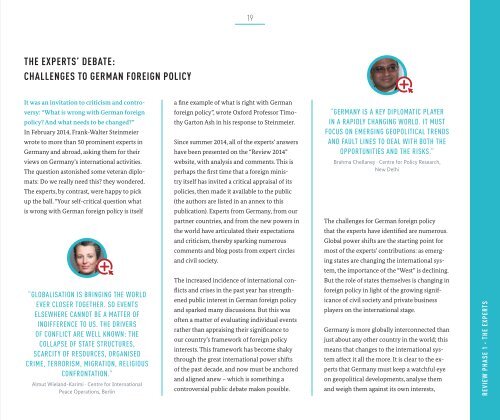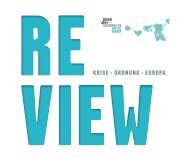Review 2014 – A Fresh Look at German Foreign Policy
“Crisis, Order, Europe” – these keywords highlight the main challenges for German Foreign Policy in the medium term. The project “Review 2014 – A Fresh Look at German Foreign Policy”, initiated by Foreign Minister Frank-Walter Steinmeier, has open up a broad public debate about the aims, interests and perspectives of German foreign policy. This report details the discussions of the past year, the expectations with regard to Germany’s global role raised within Germany and abroad as well as the foreign policy challenges in the future.
“Crisis, Order, Europe” – these keywords highlight the main challenges for German Foreign Policy in the medium term. The project “Review 2014 – A Fresh Look at German Foreign Policy”, initiated by Foreign Minister Frank-Walter Steinmeier, has open up a broad public debate about the aims, interests and perspectives of German foreign policy. This report details the discussions of the past year, the expectations with regard to Germany’s global role raised within Germany and abroad as well as the foreign policy challenges in the future.
You also want an ePaper? Increase the reach of your titles
YUMPU automatically turns print PDFs into web optimized ePapers that Google loves.
19<br />
THE EXPERTS’ DEBATE:<br />
CHALLENGES TO GERMAN FOREIGN POLICY<br />
It was an invit<strong>at</strong>ion to criticism and controversy:<br />
“Wh<strong>at</strong> is wrong with <strong>German</strong> foreign<br />
policy? And wh<strong>at</strong> needs to be changed?”<br />
In February <strong>2014</strong>, Frank-Walter Steinmeier<br />
wrote to more than 50 prominent experts in<br />
<strong>German</strong>y and abroad, asking them for their<br />
views on <strong>German</strong>y’s intern<strong>at</strong>ional activities.<br />
The question astonished some veteran diplom<strong>at</strong>s:<br />
Do we really need this? they wondered.<br />
The experts, by contrast, were happy to pick<br />
up the ball. “Your self-critical question wh<strong>at</strong><br />
is wrong with <strong>German</strong> foreign policy is itself<br />
“GLOBALISATION IS BRINGING THE WORLD<br />
EVER CLOSER TOGETHER. SO EVENTS<br />
ELSEWHERE CANNOT BE A MATTER OF<br />
INDIFFERENCE TO US. THE DRIVERS<br />
OF CONFLICT ARE WELL KNOWN: THE<br />
COLLAPSE OF STATE STRUCTURES,<br />
SCARCITY OF RESOURCES, ORGANISED<br />
CRIME, TERRORISM, MIGRATION, RELIGIOUS<br />
CONFRONTATION.”<br />
Almut Wieland-Karimi · Centre for Intern<strong>at</strong>ional<br />
Peace Oper<strong>at</strong>ions, Berlin<br />
a fine example of wh<strong>at</strong> is right with <strong>German</strong><br />
foreign policy”, wrote Oxford Professor Timothy<br />
Garton Ash in his response to Steinmeier.<br />
Since summer <strong>2014</strong>, all of the experts’ answers<br />
have been presented on the “<strong>Review</strong> <strong>2014</strong>”<br />
website, with analysis and comments. This is<br />
perhaps the first time th<strong>at</strong> a foreign ministry<br />
itself has invited a critical appraisal of its<br />
policies, then made it available to the public<br />
(the authors are listed in an annex to this<br />
public<strong>at</strong>ion). Experts from <strong>German</strong>y, from our<br />
partner countries, and from the new powers in<br />
the world have articul<strong>at</strong>ed their expect<strong>at</strong>ions<br />
and criticism, thereby sparking numerous<br />
comments and blog posts from expert circles<br />
and civil society.<br />
The increased incidence of intern<strong>at</strong>ional conflicts<br />
and crises in the past year has strengthened<br />
public interest in <strong>German</strong> foreign policy<br />
and sparked many discussions. But this was<br />
often a m<strong>at</strong>ter of evalu<strong>at</strong>ing individual events<br />
r<strong>at</strong>her than appraising their significance to<br />
our country’s framework of foreign policy<br />
interests. This framework has become shaky<br />
through the gre<strong>at</strong> intern<strong>at</strong>ional power shifts<br />
of the past decade, and now must be anchored<br />
and aligned anew <strong>–</strong> which is something a<br />
controversial public deb<strong>at</strong>e makes possible.<br />
“GERMANY IS A KEY DIPLOMATIC PLAYER<br />
IN A RAPIDLY CHANGING WORLD. IT MUST<br />
FOCUS ON EMERGING GEOPOLITICAL TRENDS<br />
AND FAULT LINES TO DEAL WITH BOTH THE<br />
OPPORTUNITIES AND THE RISKS.”<br />
Brahma Chellaney · Centre for <strong>Policy</strong> Research,<br />
New Delhi<br />
The challenges for <strong>German</strong> foreign policy<br />
th<strong>at</strong> the experts have identified are numerous.<br />
Global power shifts are the starting point for<br />
most of the experts’ contributions: as emerging<br />
st<strong>at</strong>es are changing the intern<strong>at</strong>ional system,<br />
the importance of the “West” is declining.<br />
But the role of st<strong>at</strong>es themselves is changing in<br />
foreign policy in light of the growing significance<br />
of civil society and priv<strong>at</strong>e business<br />
players on the intern<strong>at</strong>ional stage.<br />
<strong>German</strong>y is more globally interconnected than<br />
just about any other country in the world; this<br />
means th<strong>at</strong> changes to the intern<strong>at</strong>ional system<br />
affect it all the more. It is clear to the experts<br />
th<strong>at</strong> <strong>German</strong>y must keep a w<strong>at</strong>chful eye<br />
on geopolitical developments, analyse them<br />
and weigh them against its own interests,<br />
REVIEW PHASE 1 · THE EXPERTS



